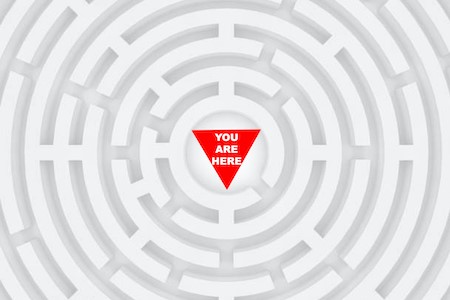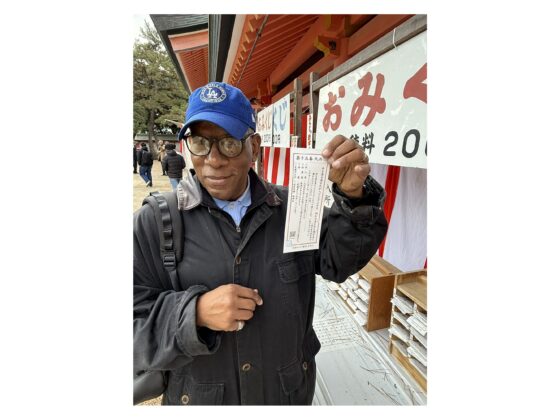Graphic by Abigale Speight
For most of us, getting a degree from Darden set us on fairly typical paths of business and management work. But sometimes, we find ourselves stuck in rut, or feeling like we need a big change or a new direction. Some of us find ourselves lost in career paths we didn’t expect, or we don’t enjoy. Some of us find ourselves in overwhelming transitions when we’re on the cusp of a new stage like retirement or returning to work from a hiatus.
I love helping Darden alumni wrestle with the big question: “What should I do with my life?”
It is that question that lead Darden Alumni Career Services to the book Designing Your Life. Published in 2016 by two Stanford academics, Bill Burnett and Dave Evans, we found their approach to contemplating career shifts both validating and refreshing. Here was a set of exercises and approachable frameworks that use design thinking guidelines to help us advance our careers. Some of our coaches gained Designing Your Life Coach certification in 2019 and began using “DYL” frameworks with clients facing tricky transitions.
“Life Design” applies the innovation principles of design thinking to the wicked problem of designing your life. Design thinking can help us create lives that are both meaningful and fulfilling, regardless of our age or stage, where we live, or what we have been doing for a living.
Last year, we adapted our DYL introductory in-person workshop and created the small group, online (Zoom-based) Life Design Lab, which I lead. We wanted to bring these powerful tools to more alumni, but do it in a way that is both intimate and impactful. Over 50 alumni have now participated in these DYL workshops to immerse deeply in the DYL approach. Here’s what one participant said:
“This was a well-balanced workshop. Not too prescriptive or burdensome in terms of ‘homework,’ but a great structure, with a select few meaningful exercises that inspired a lot of creative thought. It was great to reconnect with fellow Darden graduates. I noticed through the discussions that a real bond developed. All participants were very supportive of each person’s journey. I sensed a largely unspoken collective relief, one that I felt as well, that we are all on a career journey and are each at some personal crossroads, and that it’s perfectly OK. In fact, it is a necessary, potentially joyful, point of discovery if we have the right design tools to address it.”
– Darryl DeGuzman (MBA ’01)
Working in groups of 6-8 alumni, from any class year and any kind of background, we meet three times over a six-week period. I facilitate participants’ career exploration by using DYL exercises such as Mind Mapping and Odyssey Planning. The participants find accountability in meeting with a structure, provide feedback to one another, brainstorm ideas, and offer up connections and networking support. Many have commented that the exercises are eye-opening and motivating.
As a career coach, I’ve worked with over 800 Darden alumni. As I listen to each person’s unique “career journey,” I am often struck by how much mindsets (that is, fixed mindsets vs. growth mindsets) affect our actions and decisions.
Design Thinking Pushes to Use 5 Simple but Powerful Mindsets
- Curiosity
- Bias to action
- Reframing
- Awareness
- Radical collaboration
Learning to apply these mindsets to our own personal biases and choices can be a real shift for many. Our small group format allows us to learn and wrestle with these concepts in the context of each person’s unique journey.
Our Objectives: It’s Not Just About Job Search
While many participants in our Life Design Lab are in the process of landing new jobs, this workshop is not strictly about job search. Our objectives are broader. We explore the bigger questions related to work and life satisfaction, expose alumni to new ways of thinking about the problems and obstacles they face, help them tap into their intuition, and give them an impetus to take small steps toward bigger change. We collaborate in a safe-sharing environment and push one another to initiate a Life Design team of one’s own.
I have seen so many positive outcomes for alumni who have worked through our Life Design Lab — from gaining the confidence to explore new paths to feeling fresh energy to tackle big career moves to starting to approach networking as a learning opportunity. Of course, a few have landed new jobs, sometimes in new roles or industries or locations. Others have taken the leap to leave jobs that no longer serve them. Some have bravely faced decisions about returning to work or changing their relationship to work in retirement. As the authors say, “life design is about generating options,” and we aim to help alumni confidently guide themselves in whatever is next in their journey.
Contact Alumni Career Services if you’re interested in an upcoming Life Design Lab workshop.
*See “Mindset: The New Psychology of Success” by Carol Dweck (2006)





